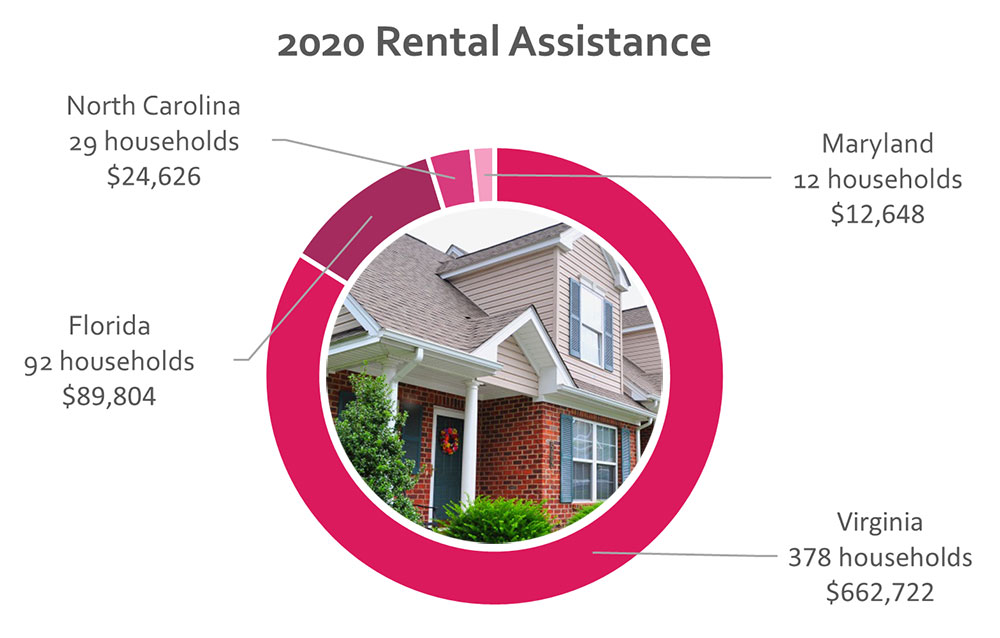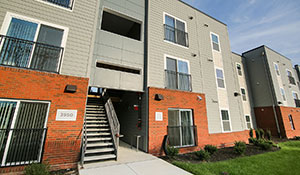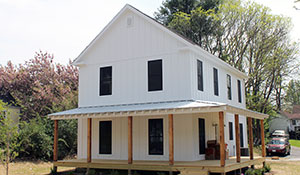March 30, 2021
Between loss of wages and unpaid bills, the COVID-19 pandemic has brought financial uncertainty to renters around the country, especially those in low-income communities. In 2020, Community Housing Partners (CHP) worked to connect hundreds of households at its apartment communities with more than $789,000 in rent relief from state and local sources—work that continues into 2021.
Both CHP Resident Services and Property Management worked to help residents in need.
“We began with the Virginia Rent and Mortgage Relief Program, which included money from Virginia’s allocation of the CARES Act and an additional $60 million that Governor Northam put in the fund back in June of last year,” said Angie Roberts-Dobbins, Vice President of Resident Services. “We started working with the program last October and helped close to 100 households secure more than $296,000 in rent relief by the end of the year.”
 CHP Property Management also connected residents with the state program, resulting in a total of 378 Virginia households helped with more than $662,000 in rental assistance. Across CHP’s portfolio, a grand total of 511 households in Virginia, Maryland, North Carolina, and Florida benefited from state and local rental relief in 2020. This work would also not have been possible without support from CHP’s Finance and Compliance teams.
CHP Property Management also connected residents with the state program, resulting in a total of 378 Virginia households helped with more than $662,000 in rental assistance. Across CHP’s portfolio, a grand total of 511 households in Virginia, Maryland, North Carolina, and Florida benefited from state and local rental relief in 2020. This work would also not have been possible without support from CHP’s Finance and Compliance teams.
“This has basically become a new line of business for us,” said Roberts-Dobbins, who explained that CHP has assigned four resident service coordinators to sort through the list of residents with high delinquency and contact those who owe the most money first. “Many residents are skeptical, but if they are interested and have been affected by COVID, we will submit an application on their behalf.”
Residents who have been furloughed, lost their job, missed work because of a COVID diagnosis, or had to leave a job to care for school-age children are all eligible for rent relief. In Virginia, residents had to provide verification that they are at or below 80% of the area median income and that their rent is below 150% of fair market rate. Other states had similar requirements.
“The program not only provided rent relief for the current month, but also for previous months in cases where residents owed back rent,” Roberts-Dobbins explained. “So far, when we have submitted applications to Virginia Housing for eligible renters, we have not had anyone denied funding.”
This helps renters escape the cycle of debt, which has increasingly become a problem in the COVID era. Although federal and state governments have banned evictions for nonpayment, tenants must still pay rent or risk getting behind. According to a report from the National Low Income Housing Coalition, between 10 and 14 million households in the United States were behind on their rent last fall and renters may have owed between $25 and $34 billion in unpaid rent by January 2021.
Emergency rental assistance programs can not only help alleviate these numbers and avoid a nationwide rental crisis—they can also address the social and economic disparities highlighted by the pandemic. Although the virus can infect anyone, research has shown differences in exposure rates, mortality rates, and other impacts based on income.
CHP continues to help residents remain stably housed in 2021. With a new name and new focus on renters, the Virginia Rent Relief Program received an additional $160 million in federal housing assistance in February 2021. CHP has already submitted applications for 52 new households and 11 previously funded households in Virginia this year and will continue this work for as long as funds remain available.
Learn more about CHP’s pandemic response on the COVID-19 Information webpage.


